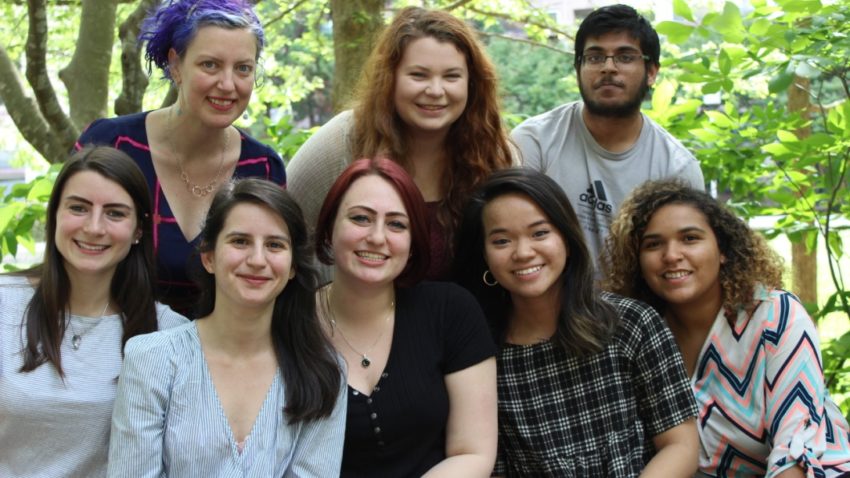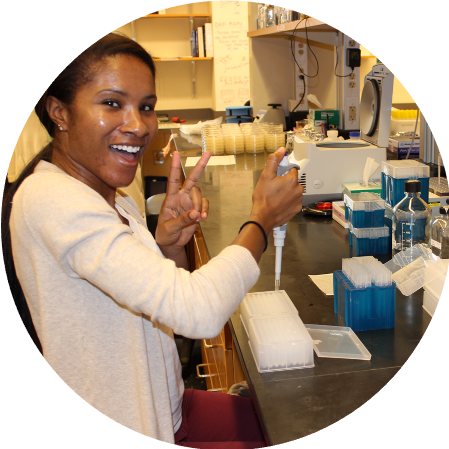Genome plasticity serves to generate genetic variation within a population of cells and provides the underpinnings for natural selection to facilitate adaption. We investigate the genome dynamics of the yeast Candida albicans, a commensal that primarily resides in human gastrointestinal tracts, yet causes superficial infection in healthy individuals and serious infection in immunocompromised individuals and can rapidly acquire resistance to antifungal drugs. We are interested in characterizing the host and environmental drivers as well as the cellular mechanisms resulting in genomic alterations ultimately leading to fungal pathogen virulence and adaption. The Hickman lab employs traditional genetics, experimental evolution, along with molecular and cellular biology approaches to analyze microbial populations under a variety of environmental and host conditions.
Department of Biology | Emory University | Atlanta, GA | (404) 727-6552 | mhickm3 [at] emory [dot] edu
Spring 2021
Congratulations to Emily (Honors Biology student) for:
- Successfully defending her thesis “Investigating in vivo and in vitro trade-offs of antifungal resistance in Candida albicans.” Emily was awarded High Honors for her excellent research!
Congratulations to Amanda (GMB PhD student) for:
- Making it to the finals of Emory’s 3-Minute Thesis (3MT) competition!
- Posting her second, first-author paper! Read it here: Host defense mechanisms induce genome instability in an opportunistic fungal pathogen. BioRxiv doi: https://doi.org/10.1101/2021.04.01.438143
- Presenting her research in the Genome Dynamics & Evolution session of the Microbiological Society’s conference on Candida & Candidiasis!
Congratulations to Ogie (GMB PhD student) for:
- Posting her second, first-author paper along with Emily (Honors Biology UG)! Read it here: Tetraploidy accelerates adaptation under drug selection in a fungal pathogen. BioRxiv doi: https://doi.org/10.1101/2021.02.28.433243
Fall 2020
- Congratulations to Amanda for presenting her research at the 46th Southeastern Population Ecology & Evolutionary Genetics (virtual) meeting October 30, 2020 and for winning ‘Best Talk’ of the meeting!
- Congratulations to Emily (Honors Biology UG student) and Ogie (GMB PhD student) for being selected to orally present their research at the 8th Cell Biology of Eukaryotic Pathogen (virtual) meeting!
Summer 2020
- We wish our fearless research technicians, Courtney and Judy, the best of luck as they leave the lab to begin medical school. We will miss you dearly, but excited to hear about your future successes!
- Congratulations to former lab members Dorian (MSc, PBEE) and Rema (undergrad turned research tech) for publishing their second paper! Read it here: Virulence phenotypes result from interactions between pathogen ploidy and genetic background. Ecology & Evolution; 2020;00:1–13.
Spring 2020
- Congratulations to Amanda (GMB PhD student) for publishing her first, first-author paper! Read it here: Host-Induced Genome Instability Rapidly Generates Phenotypic Variation across Candida albicans Strains and Ploidy States. mSphere 5: e00433-20
- Ogie (GMB PhD student) presents her research at the virtual The Allied Genetics Conference (TAGC). See her poster Tetraploid C. albicans adapt rapidly and robustly to caspofungin drug stress.
Fall 2019
-
Meleah was awarded an NSF CAREER award! With this award, we will continue to study how ploidy transitions facilitate rapid adaptation to antifungal drugs and virulence evolution, and develop a science writing class for undergraduates.
- Congratulations to Ogie (GMB PhD student) on publishing her first, first-author paper! Read it here: The magnitude of Candida albicans stress-induced genome instability results from an interaction between ploidy and antifungal drugs.G3,9:4019-4027
Spring 2019
- Congratulations to Dorian (MSc, PBEE), Rema (undergrad turned research tech) and Nancy (undergrad) for publishing their first paper! Read it here: A novel virulence phenotype rapidly assesses Candida fungal pathogenesis in healthy and immunocompromised Caenorhabditis elegans hosts. mSphere, 4:e00697-18









